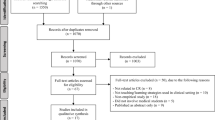Abstract
Two formats of case presentation are traditionally used for teaching problem-solving skills: clinical vignette or chief complaint formats. While the first one is more commonly used, it does not completely reflect the actual problem-solving process during a real encounter, which may hamper the learners to integrate separately acquired data gathering skills into their reasoning process and affect their diagnostic performance in practice. The present study compared diagnostic accuracy when the reasoning stimulus was a case vignette containing all diagnostic information versus the patient's chief complaint only. Forty-two medical students, 53 residents and 60 general internists participated in the study. Diagnostic accuracy was significantly lower for the chief complaint format at the student, resident, and practitioner levels. Analysis of the data gathered in the chief-complaint format revealed that faulty diagnostic decisions resulted from a failure to gather critical data. The results suggest that data gathering techniques, semiology, and medical reasoning should be trained in association and that this effort should be pursued beyond medical school.
Similar content being viewed by others
References
Barrows, H.S., Norman, G.R., Neufeld, V.R. & Feightner, J.W. (1982). The clinical reasoning process of randomly selected physicians in general medical practice. Clinical and Investigative Medicine 5: 49–56.
Bordage, G. (1994). Elaborated knowledge: A key to successful diagnostic thinking. Academic Medicine 69: 883–885.
Chang, R.W., Bordage, G. & Connell, K.J. (1998). The importance of early problem representation during case presentations. Academic Medicine 73(10 Suppl): S109–S111.
Cox, K. (1996). Teaching and learning clinical perception. Medical Education 30: 90–96.
Elstein, A.S., Shulman, L.S. & Sprafka, S.A. (1978). Medical Problem Solving: An Analysis of Clinical Reasoning. Cambridge, MA: Harvard University Press.
Evans, B.J., Coman, G.J. & Goss, B. (1996). Consulting skills training and medical students' interviewing efficiency. Medical Education 30: 121–128.
Friedman, C.P., McNutt, R.A., de Bliek, R., Evans, A.T., Wallsten, T.S. & Martz, J.M. (1994). Visual information and the diagnosis of chest pain. Academic Medicine 69(10 Suppl): S28–S30.
Gruppen, L.D., Wolf, F.M. & Billi, J.E. (1991). Information gathering and integration as sources of error in diagnostic decision making. Medical Decision Making 11: 233–239.
Norman, G.R., Brooks, L.R., Cunnington, J.P.W., Shali, V., Marriott, M. & Regehr, G. (1996). Expert-novice differences in the use of history and visual information from patients. Academic Medicine 71(1 Suppl): S62–S64.
Schmidt, H.G., Norman, G.R. & Boshuizen, H.P. (1990). A cognitive perspective on medical expertise: Theory and implication. Academic Medicine 65: 611–621.
Vu, N.V. & Steward, D.E. (1990). Variant accuracy in methods of assessing clinical performance. In W. Bender, R.J. Hiemstra, A.J.J.A. Scherpbier & R.P. Zwierstra (eds.), Teaching and Assessing Clinical Competence, pp. 190–194. Groningen: BoekWerk Publications.
Author information
Authors and Affiliations
Rights and permissions
About this article
Cite this article
Nendaz, M.R., Raetzo, M.A., Junod, A.F. et al. Teaching Diagnostic Skills: Clinical Vignettes or Chief Complaints?. Adv Health Sci Educ Theory Pract 5, 3–10 (2000). https://doi.org/10.1023/A:1009887330078
Issue Date:
DOI: https://doi.org/10.1023/A:1009887330078




